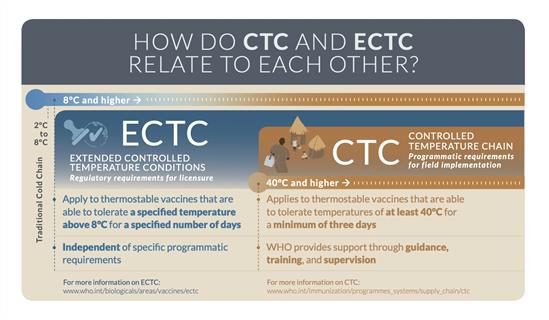Extended Controlled Temperature Conditions (ECTC)
Vaccines have to be kept under recommended storage conditions that guarantee the maintenance of their quality during production, storage, handling, transportation and use. As a result, extensive measures are put in place to avoid exposure of the product to inappropriate temperatures. Almost all vaccines used in immunization programs today are licensed for storage and distribution within the traditional cold chain of 2°C to 8°C. However, keeping vaccines within this range is extremely difficult in countries with limited cold chain and ice pack production capacity. As a result, the increasing cost and/or logistical constraints of vaccine delivery due to these cold chain requirements significantly hamper vaccine access.
To address these distribution challenges and expand immunization programmes to hard-to-reach populations, the World Health Organization (WHO) developed an innovative approach referred to as a “controlled temperature chain” (CTC). This programmatic strategy requires that a vaccine exhibits a stability profile suitable for a single exposure tolerating at least 40°C for a minimum of three days just prior to administration, while remaining compliant with the approved vaccine specifications. Additionally, the programme requires that the CTC provision should be included in the licensure by the relevant NRA and by WHO prequalification.
During several regulatory expert consultations (Ottawa, Canada, December 2012; Langen, Germany, 2013; Geneva, Switzerland; 2015) it was agreed that there was a need for WHO guidance on stability evaluation of vaccines higher than 8°C. During the consultations the term “extended controlled temperature conditions” (ECTC) was proposed to distinguish regulatory requirements from programme aspects. An ECTC assessment should assure the performance of a vaccine following short-term exposure at any temperature above the traditional 28 °C cold chain that might support vaccine distribution. Thus ECTC encompasses CTC but is independent of the specific programmatic requirements of the current WHO CTC programme. The ECTC guidelines also provide the application of mathematical modelling and statistical concepts to address the unique short-term requirements of certain vaccines. Vaccines licensed for use under ECTC are required to have sufficient information regarding the approved conditions (e.g. maximum temperature and time) on the package insert.
Written Standards
Meeting reports
WHO/Paul-Ehrlich-Institut Informal Consultation on Scientific and Regulatory Considerations on the Stability Evaluation of Vaccines under Controlled Temperature Chain (CTC)
WHO/ Health Canada Drafting Group Meeting on Scientific and Regulatory Considerations on the Stability Evaluation of Vaccines under Controlled Temperature Chain
Further resources

